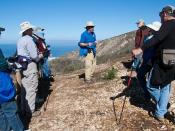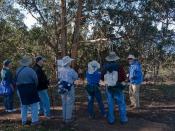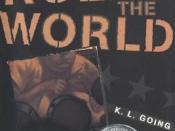Major Works Report Fourth Quarter
Fat Kid Rules the World by K. L. Going
Quote 1: pg 56
THE NEXT TIME I SEE CURT it's by accident. I'm walking to the F train at Washington Square, daydreaming about the girl in the cafeteria, wondering if by any chance Dayle saw her talking to me. It's Saturday and I'm coming back from a dentist appointment. I'm happy because I'm thinking about the girl, but I'm bummed because Dayle was supposed to go to the dentist, too, but he wouldn't. No big deal. Except I keep remembering how it was after Mom got sick when he was too little to ride the subway by himself. I'd hold his hand and put his token in the slot like a real big brother. That was a long time ago, before I caused him mortal embarrassment. Before he turned into a self-centered asshole. We don't talk about it, ever, but when Mom was dying and Dad had to spend all his time at the hospital, it was me and Dayle. Buddies. Pals. I swear to God he looked up to me. I don't have any proof, but I remember the way he'd follow me around the apartment and try to get me to play basketball at the park. I was never good at sports, even when I was thin, but in those days I could still make it to the court and back.
This shows conflict.
This shows the conflict between Troy and Dayle, and how it started. When they were young, they were good friends, but their mom was very sick and died. They were good brothers a long time ago, but they have grown apart because of their differences, like how Dayle is athletic and Troy is lazy and fat.
Quote 2: pg 21
"A bam, bam, braaat, braaat, bam, bam, bam, braaat, braaat, bam, bam, braaat, braaat, bam ⦠and then this sweet bass line jumps in and it's weeeehhh â¦" Curt makes a high-pitched scream right there in the street and everyone who's been staring at us looks away. Desperate, I fling open the cab door and slide in quick as I can, hoping Curt's scream will mask my departure. Then I realize he's climbing in the other side. "What are you doing?" I ask, but Curt pretends he doesn't hear. I know he heard me because he raises the volume on his music monologue. I have to lean forward and shout to be heard by the driver as I yell my address. Curt talks the whole ride home. He talks about chord progressions, then guitars. He names all the makes and models, then rates them. Then he lists them again in order of his rating. Then he changes the list and recites the revised version twice as if cementing it. He does the same thing, for my benefit I presume, with drum sets. Then he starts on bands. It's only a few blocks, but by the time the cab pulls up to my apartment building I think I might strangle him. Not only is he driving me insane but his stench is making me nauseated. I've tried to roll down the window without being too obvious, but when the cab stops, I bolt. I waddle over to pay the driver and Curt stands on the curb with his hands dug deep in his pockets. I hope he won't notice as I take out my hidden ten-dollar bill, the one I told him I didn't have, but he just stares at the pavement as the cabdriver grabs the money and steps hard on the gas.
This shows character.
This shows how Curt's personality really is compared with him earlier in the book. At the beginning of the book he is shady and cunning, but in the quote he expresses his real personality and shows his character. He is doing a drum solo without drums as they are getting in the cab. And the main character Troy is getting embarrassed, but Curt raises his voice even more when Troy takes concern. Curt also shows his intelligence with his knowledge of music and guitars, even if he doesn't express it most of the time.
Quote 3: pg 25-26
Once we're inside he makes Curt sit in one place while he gets him a bathrobe, towel, and new set of clothes. The clothes will never fit, but that doesn't stop Dad from declaring that everything Curt is wearing must be disposed of. Curt's face turns horrible shades of white and I think he might pass out, but he doesn't say a word. Only coughs twice. Despite this, Curt looks supremely happy as he walks down the hall from the living room to the bathroom. He stares at every picture, and there're a lot of them. The apartment is filled with pictures of our family and in every one of them Mom's beautiful. She's always smiling and her long, dark hair makes her look Mexican. She looks nothing like my father, brother, and me. I watch Curt studying her and wonder what he sees. Does he think I'm adopted? When Curt finally disappears into the bathroom, Dayle explodes. "You can't really think you and this homeless kid can start a band. Where did you meet him anyway? He smells. He's a freak. He's worse than you, Troy. Almost worse than you. No one's really worse than you because you're such a major loser." I swallow hard. My little brother doesn't get the fact that this is Curt MacCrae. He's not just any homeless person. He's a school legend. If Dayle weren't a freshman jock he'd know that. "You're too young to remember," I say, "but Curt was real popular at school a couple years ago. And he's not homeless all the time." My cheeks huff while I talk. Dayle pouts. "Troy, you're the king of morons. You haven't played drums since seventh grade, and you weren't even good then. You don't own a drum set. You can't be active for more than five minutes before you're out of breath. Who do you think you and this Curt person are going to play for, anyway? You never go out. I swear to God â¦" I could drop the lie right there, but I don't. "Curt's a great musician," I say instead. "You'll see, Dayle. He's going to teach me everything he knows and Rage/Tectonic is going to be huge. Just wait." Just wait.
This shows point of view.
In the quote, it shows how the author wrote this. It's like the character is telling his own story from his own point of view, using "I" whenever he describes himself. He talks about other people normally. He also expresses his emotions, which play a large part of the main character in this book.
Quote 4: pg 109
FIRST SOUNDS ARE THE DRUMS. They break like thunder, unexpected, and the backbeat is set, manic and wild. I feel the smack of the drumsticks in the pit of my stomach as they snap against the skin. The crowd begins to pulse. The lights come up red as fire and the stage is hell. I look at it and sweat. The sweat drips down my cheeks, into my mouth. It stings my eyes. I squint upward at the black silhouettes glaring down at me. I stare at them, trying to connect them in my brain to anyone I know. But I can't. They aren't those people anymore. They aren't even human. Ollie? I think. Piper? The sound is so loud I can't hear myself think. The drums go on forever, torturing us with the prelude. They toy with the crowd, saying "fuck you" before the music's even started. Then the lights go up and Mike leers over us. He doesn't say anything, just starts singing. Screaming really. His voice is a wailing falsetto, and he lets the sounds grate like a challenge. The guitars take up the call. Piper's on bass and Leon's the lead and they dip in with the refrain, pushing their lines until Mike's ready to add words to the milieu. All my attention is up front and I'm straining forward waiting for the words to come. Mike opens his mouth and Piper leaps into the air as if he's been shot, almost falls backward, but pulls upright at the last moment. He doesn't care. He thrashes like a small demon while Leon strides across the stage to loom over him. They make two opposite, unnatural curves. Mike finally releases the verse, letting it crash over the audience.
This shows style.
This shows how the author uses the senses to make a picture in the readers mind. The most prominent use of sense is the sounds. The author uses music to make pictures, like the drums "break like thunder, unexpected, and the backbeat is set, manic and wild." Then sight, "The lights come up red as fire and the stage is hell," and "I squint upward at the black silhouettes glaring down at me." The reader gets a imaginative picture from the authors style.
Quote 5: pg 182
WE'RE STANDING OUTSIDE watching traffic and my mind is spinning. It's cold out, but the cold makes me alive. The sounds of the city are loud, intense. Horns, voices, music somewhere in the distance. Life has shrunk to the size of this time and this place. Me. Curt. A second chance. The implications are staggering. I stare at each person walking by and imagine the moment they open their mouths, forks poised in midair. I picture them licking ice-cream cones, tongues extended. Some of this makes me happy. Insanely happy. A short Spanish woman walks by and I picture her eating a taco and practically get tears in my eyes. I see an old man with massive age spots and imagine him eating something forbidden, like a vanilla cream-filled Dunkin' Donut. I imagine the way the cream would spurt all over his face and how he probably wouldn't be able to chew it, so there'd be food spilling down his chin, but he wouldn't care because he'd be happy and when you're old no one expects you to have a facade. I imagine myself as that old man.
This shows setting.
Troy now notices a lot more things with some help from Curt. It gives a great picture of the setting when Troy goes around just noticing everything that's going on. He uses a lot of senses, like when he sees things, but also when it feels cold out, or when there is horns, voices and music in the distance. He also sees a lot of food.
Quote 6: pg 201
"How can a mother refuse to visit her kid in the hospital? What if he died?! I bet she'd be sorry thenâ¦." I don't mean to, but my voice rises and I pound my fist into the bed. Curt doesn't move, but his heart monitor beeps faster. Dad glances at it, then reaches over and puts his large leathery fist on top of mine. I draw in a quick breath and Dad lets go of my hand. He starts talking the way he used to talk after the funeral. Slow, steady, calm. "Sometimes," he says, "people give up on each other. They don't mean to, but things happenâ¦." There's a long silence. "In the military," Dad starts again, "we teach our boys to go the distance. Just like I tried to teach you and Dayle. A soldier never gives up until they've reached their objective. Perseverance." Dad pauses. "But in wartime," he says, "it's easy to remember because there's a war to be fought and you have to fight it. You give it one hundred percent because your life depends on it. In civilian life it's not that easy and sometimes people give up too soon. It doesn't mean they stop loving each other, but maybe they stop trying so hard and let things slide when they ought to hang on tight. Maybe they don't tunnel through the mud because they think they don't have to, or they get tiredâ¦."
This shows theme.
This shows the theme of perseverance within the book. Ever since Troy met Curt, he has had some additional challenges in his life. Curt puts Troy through lots of stress when they have a performance, or like the situation in the quote where Curt has gotten sick and passed out on the sidewalk and Troy had to take him to the hospital.
Quote 7: pg 249-250
Beginning: I'M A SWEATING FAT KID standing on the edge of the subway platform staring at the tracks. I'm seventeen years old, weigh 296 pounds, and I'm six-foot-one. I have a crew cut, yes a crew cut, sallow skin, and the kind of mouth that puckers when I breathe. I'm wearing a shirt that reads MIAMI BEACH-SPRING BREAK 1997, and huge, bland tan pants-the only kind of pants I own. Eight pairs, all tan. It's Sunday afternoon and I'm standing just over the yellow line trying to decide whether people would laugh if I jumped. Would it be funny if the Fat Kid got splattered by a subway train? Is that funny? I'm not being facetious; I really want to know. Like it or not, apparently there's something funny about fat people. Something unpredictable. Like when I put on my jacket and everyone in the hallway stifles laughter. Or when I stand up after sitting in the cafeteria and Jennifer Maraday, Brooke Rodriguez, and Amy Glover all bust a gut. I don't get angry. I just think, What was funny about that? Did my butt jiggle? Did I make the bench creak so that it sounded like a fart? Did I leave an indentation? There's got to be something, right? Right? So it's not a stretch to be standing on the wrong side of the yellow line giving serious thought to whether people would laugh if I threw myself in front of the F train. And that's the one thing that can't happen. People can't laugh. Even I deserve a decent suicide.
End: Out front the announcer's voice is whipping the crowd into a frenzy. "Back from the dead, for one final performance, straight from the psych ward, in the custody of the military police, with one last shot at free expression before being dragged away to jail â¦" I look at Curt. "We're going to be huge," I tell him. "Fuck the weatherman, we're going to be huge!" He gives me a weird look, but I don't have time to explain. They're calling our name. There's a chant rocking The Dump and it's our name-Rage/Tectonic. I nod at Curt. "Let's have this conversation." This time I lead. I slide in behind the drum set and let my huge ass sprawl over the chair. I'm the poster boy for obese drummers and I know I look funny. I lift my arms high above my head and hold them there, flesh dangling, waiting for Curt's signal. I have two seconds to look out over the audience. A moment of time to see all the twisted, bony, warped parodies of hands reaching for me. A flash of timelessness to see my father and brother standing backstage waiting to hear what I have to say. I have two seconds to look at Curt and see the wicked grin on his face. Then my arms are crashing down and for the first time, live and in public, the drumsticks snap against the skins.
This shows Opening/Closing
At the beginning of the book, Troy is contemplating suicide. He is unhappy with his life and he is very self conscious. At the end, he is performing in front of many people, and he knows he looks bad but he doesn't care. He is not self conscious any more, which was his big weakness. Now he just is playing the music.


